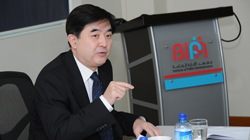

In a panel discussion organized by BIPA entitled: “National Governance in China: Practices and Ideas”, the Chinese Ambassador to the Kingdom of Bahrain Mr. Lee Chen met with the 9th batch of preparation program for government leaders “leaders”, where the Ambassador reviewed the administrative experience of his country and spoke about the Beijing model in government leadership, which contributed mainly in China's transition from the 10th rank economically to the 2nd rank after the United States.
The Ambassador Chen pointed out to the several important factors that enriched the administrative development processes on which the Republic of China arose to the ranks of developed countries, such as the importance of continuity in thinking of renewal and liberate ideas’ restrictions, considering change as the basis for progress, and relying on leadership for development and progress in the presence of clear, transparent and binding rules. Mr. Chen added that investing in the Chinese citizens was a fundamental principle that the Republic of China used it to launch the development processes through China’s chronology and stages of advancement, which has been carried out on two stages: the first was post-revolution, and the second after the reform and openness.
During the meeting the Chinese Ambassador pointed out that the application of proper administration philosophy contributed to the reduction of the service ministries in China since 1982, from 100 Ministries to 25 Ministries only in 2013, due to the reason of reliance on centralization in administration and leadership and pursuing a policy of centrally planned economy, the Ambassador called on showing initiative and providing more opportunities for the exchange of ideas on leadership and management.
On the other hand, the Executive Director of Learning and Development at BIPA Mr. Ishaq Ameen revealed that His Majesty’s visit to Beijing has opened prospects for increasing mutual relations between the Peoples Republic of China (PRC) and the Kingdom of Bahrain, followed by a visit of BIPA’s delegation to China last December to review its model of leadership and administration, stressing that BIPA follows a strategy of taking advantage of both internal and external experiences in order to achieve the objectives of the Institute to share best international practices in enriching the government work, in order to maintain the continuity of excellence and quality in the various local administrative fields.
It is worth mentioning that the meeting comes within the framework of the strategic partnership carried out by BIPA with the PRC, also previously the Chinese administrative reform society participated with the largest Chinese delegation during last June 2013, in the largest international gathering hosted by BIPA, which included about 500 participants from 71 countries around the world, represented in the 29th International Congress on Public Administration, which discussed the subject of “The Future of public Administration: Leadership and Professionalism”.
